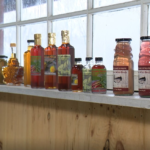
BARNARD, Vt. (WCAX) – Maple reigns supreme in Vermont, with the state producing millions of gallons of the liquid gold. However, some producers are expanding their operations to a relatively untapped market.
Birch tree tapping happens towards the end of maple season, using the same tools and methods as maple – but it’s not a one-size-fits-all operation.
“You can’t just apply our tapping guidelines and what we know about maple to birch – they’re fundamentally different species,” said Mark Isselhardt, a Maple Specialist with UVM Extension.
Silver Lake Syrups in Barnard is one of the places that produces birch syrup, and owner Eric Withington says the decision to tap birch was an easy one.
“We could do it quite easily. We have the trees, we have the resources, the arch, the pans to do it, and the time, so we might as well try it out – and we tried it out and it was well received,” said Withington.
Compared to his maple operation, Withington’s birch operation boils down to a fraction of his maple – only making about 20 to 30 gallons a season.
“What I’ve experienced is tap a tree and put a bucket under it exactly like maple – except the birch trees I’ve tapped don’t stop running,” he said.
Despite a seemingly constant flow of sap, birch has a fraction of the sugar content compared to maple. This means it needs nearly three times the amount of sap to get the same amount of syrup.
Needing much longer to boil, it produces a smaller yield, prompting Withington to sell his batch by the ounce rather than the gallon.
“It’s still in the small stages and we hope to advance it a bit and get a little larger with it,” said Withington.
Though available in a smaller size, birch syrup packs a big, robust flavor. It might not have its place on pancakes, but Withington says it goes well in sauces, glazes, and tonics.
